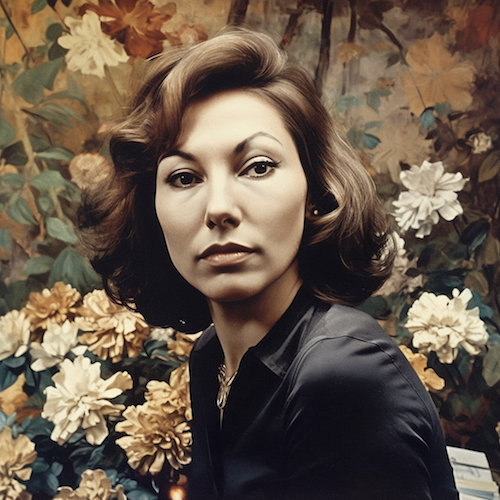¶ Clarice Lispector: A Fascinating Literary Figure

¶ Introduction
Clarice Lispector was a renowned Brazilian novelist, whose enigmatic persona and remarkable literary achievements have left an indelible mark on the world of literature. Born on December 10, 1920, in Chechelnyk, Ukraine, Clarice's family emigrated to Brazil when she was just two months old, seeking refuge from the political turmoil in their homeland. Her family settled first in Maceió, then in Recife, and later on in Rio de Janeiro.
¶ Career
Clarice displayed exceptional intellectual prowess from a young age. She demonstrated her passion for writing and storytelling, a talent that would later become her defining legacy. In 1937, she entered the Law School of the University of Brazil (today University of Rio - UFRJ), then one of the most prestigious institutions of higher learning in the country.
Her writing career began as a journalist, but it was her debut novel, "Near to the Wild Heart" (Perto do Coração Selvagem), published in 1943 when she was only 23 years old, that established her as a literary force to be reckoned with. The novel was hailed for its innovative narrative style, introspective exploration of human consciousness, and its portrayal of complex female characters.
Throughout her life, Clarice Lispector continued to captivate readers with her unique blend of poetic prose and existential themes. She published numerous novels, short stories, and essays, including "The Passion According to G.H." (A Paixão Segundo G.H.), "Água Viva," and "The Hour of the Star" (A Hora da Estrela), each earning her critical acclaim and a devoted following.
¶ Enigmatic figure
However, despite her literary success, Clarice Lispector was a mysterious and reclusive figure. She often shied away from interviews and public appearances, preferring to let her writing speak for itself. This aura of mystique further fueled the fascination surrounding her work, and she became a symbol of introspection and artistic brilliance.
¶ Beauty and Presence
Clarice Lispector's beauty was not the conventional kind that one might find in Hollywood stars or fashion models. Her allure lay in her intense and enigmatic presence, which left a strong impression on those who had the privilege of encountering her. Tall and slim, with striking eyes that seemed to hold a universe of emotions, Clarice's physical appearance seemed to mirror the depth and complexity of her writing.
Beyond her external features, it was Clarice's inner beauty and intellectual brilliance that truly captivated those who knew her. Her introspective nature and acute sensitivity to the human condition emanated from her every word, both in her writing and in person. Those who met her often described her as having an aura of mystery and wisdom that drew them in.
Clarice's ability to connect with others on a profound level was a hallmark of her personality. When engaged in conversation, she displayed a keen interest in her interlocutors, as if she could see into the depths of their souls. Her words were imbued with empathy and a deep understanding of the human experience, leaving a lasting impact on those fortunate enough to have shared a moment with her.
Furthermore, her literary achievements and thought-provoking themes in her works further cemented her status as a mesmerizing figure. Readers often felt a profound connection with her writing, as if she had a unique way of speaking to the depths of their own hearts and minds.
¶ Legacy
Clarice Lispector's legacy in the global scale of literature is significant and enduring. She is widely regarded as one of the most important and influential writers of the 20th century, and her impact on literature extends far beyond the borders of Brazil. Her works have been translated into more than 20 languages worldwide to reach a broader global audience.
¶ Death
Tragically, Clarice Lispector's life was cut short. On December 9, 1977, one day before her 57th birthday, she passed away in Rio de Janeiro. The cause of her death was ovarian cancer. Her untimely departure marked the end of an extraordinary literary career, leaving readers and critics to ponder the immense potential that might have been explored had she lived longer.
Sources:
https://es.wikipedia.org/wiki/Clarice_Lispector
“Why This World: A Biography of Clarice Lispector”, Benjamin Moser, Oxford University Press
https://site.claricelispector.ims.com.br/en/2018/05/02/conversa-com-jose-castello/
https://www.newyorker.com/culture/the-new-yorker-interview/a-lost-interview-with-clarice-lispector
https://site.claricelispector.ims.com.br/en/